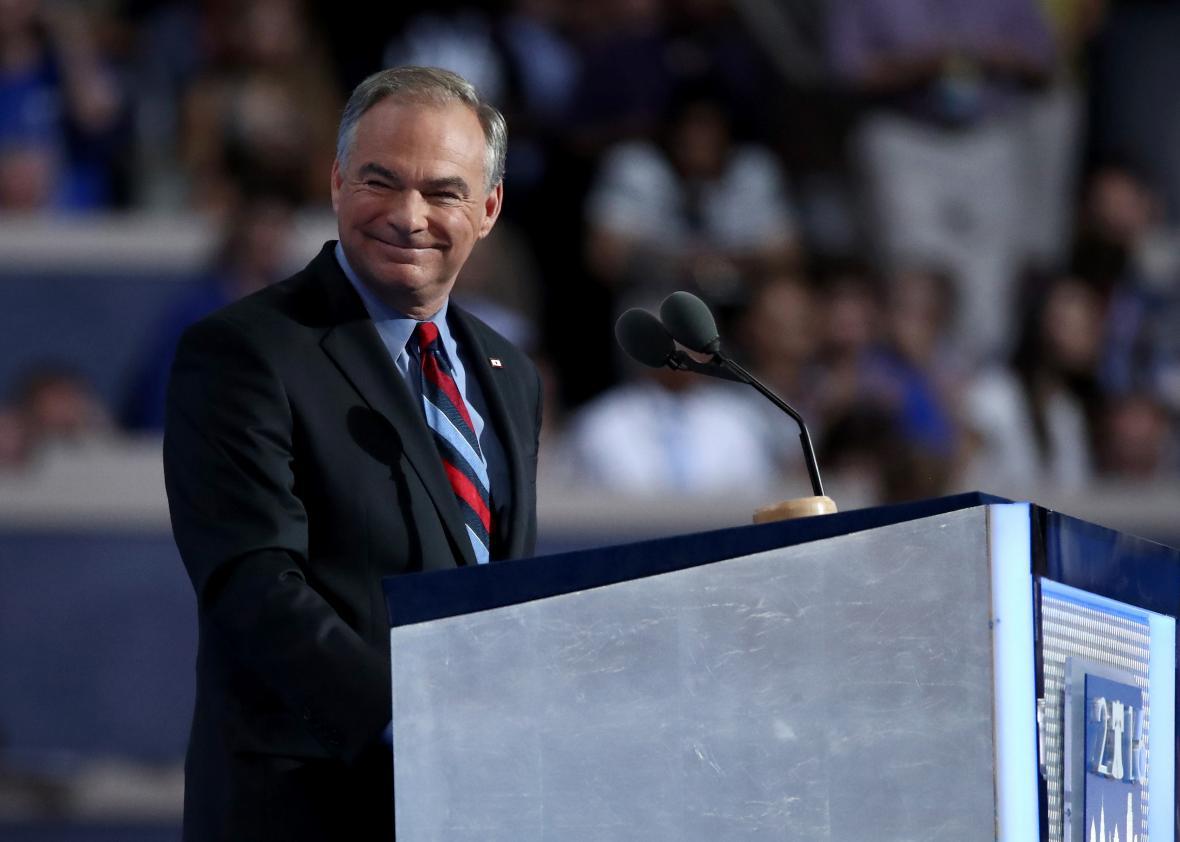Tim Kaine reaffirmed his opposition to public funding for abortion care on Friday, standing against both Hillary Clinton and the Democratic Party’s platform. “I have been for the Hyde Amendment, and I haven’t changed my position on that,” the vice presidential candidate told CNN’s Alisyn Camerota on New Day. The Hyde Amendment is a rider that has been attached to every yearly appropriations bill since 1976, prohibiting federal Medicaid dollars from funding abortions, except in cases of rape or incest or to save the life of the pregnant woman.
Clinton called for the repeal of the Hyde Amendment in January, making a strong statement about the connection between reproductive and economic justice. A few months later, the Democratic Party added demolishing Hyde to its platform for the first time.
When Clinton selected Kaine as her running mate, abortion-rights advocates protested that the senator and former Virginia governor’s record on the issue was spotty. Like fellow Catholic Joe Biden, Kaine has said that his faith has made him personally opposed to abortion but that he supports the Supreme Court–affirmed right of a woman to have one if she chooses.
But Kaine’s attempt to strike a similar middle ground on Hyde in recent days has made him look like a weakling on women’s rights, not a principled pragmatist. He reportedly told Clinton’s people “privately” that he’d stand behind her in her efforts against Hyde. The Wall Street Journal reports that a Clinton-Kaine campaign spokesman said, “The senator is not personally for repeal of the Hyde Amendment,” but “as he’s made clear, he is committed to carrying out Secretary Clinton’s agenda.”
It’s wonderful that Kaine would never personally terminate a pregnancy, since he cannot get pregnant and will never have to make that decision. But when a politician’s personal beliefs bleed into his positions and legislative decisions, they are no longer personal nor beliefs. They are political actions that affect constituents’ lives and livelihoods.
Hyde has long been an archetypal example of legislators using poor women’s bodies as political battlegrounds. Politicians who support the Hyde Amendment aren’t just trying to keep some women from getting a constitutionally protected medical procedure. They’re entrenching a system that lets rich women do whatever they want with their bodies—which, let’s be honest, they’ll be able to do no matter how severe abortion restrictions get—while poor women’s bodies remain under the custodianship of whichever politicians happen to be in office.
This makes repealing the Hyde Amendment more than just an incremental step toward true reproductive freedom. It’s at the very heart of a movement that’s slowly shifting its paradigm from choice and rights to a broader focus on justice and access. For as long as women’s reproductive health has been legislated by politicians, the reproductive rights movement has delivered the bulk of the gains to wealthy white women, while poor women, women of color, and other marginalized women have been left behind. For the Democratic Party to take economic injustice and gender inequality seriously, it must fight like hell on Hyde.
Abortion care is health care. Doctors provide it, many private health insurance plans cover it, and the law says women must have access to it. (Remember all that “undue burden” stuff?) There has long been a public and political consensus that taxes should pay the health care costs of people without sufficient income to pay them; I’m sure Tim Kaine wouldn’t contradict that consensus. By singling out abortion as the one procedure poor women shouldn’t be able to access, Kaine is demonstrating a lack of commitment to the poor and a willful ignorance about the root causes of economic insecurity. He supports a woman’s right to choose, in other words, but only if she has money. To paraphrase Clinton’s acceptance of Planned Parenthood’s presidential endorsement in January, a right that depends on personal wealth is no right at all.
